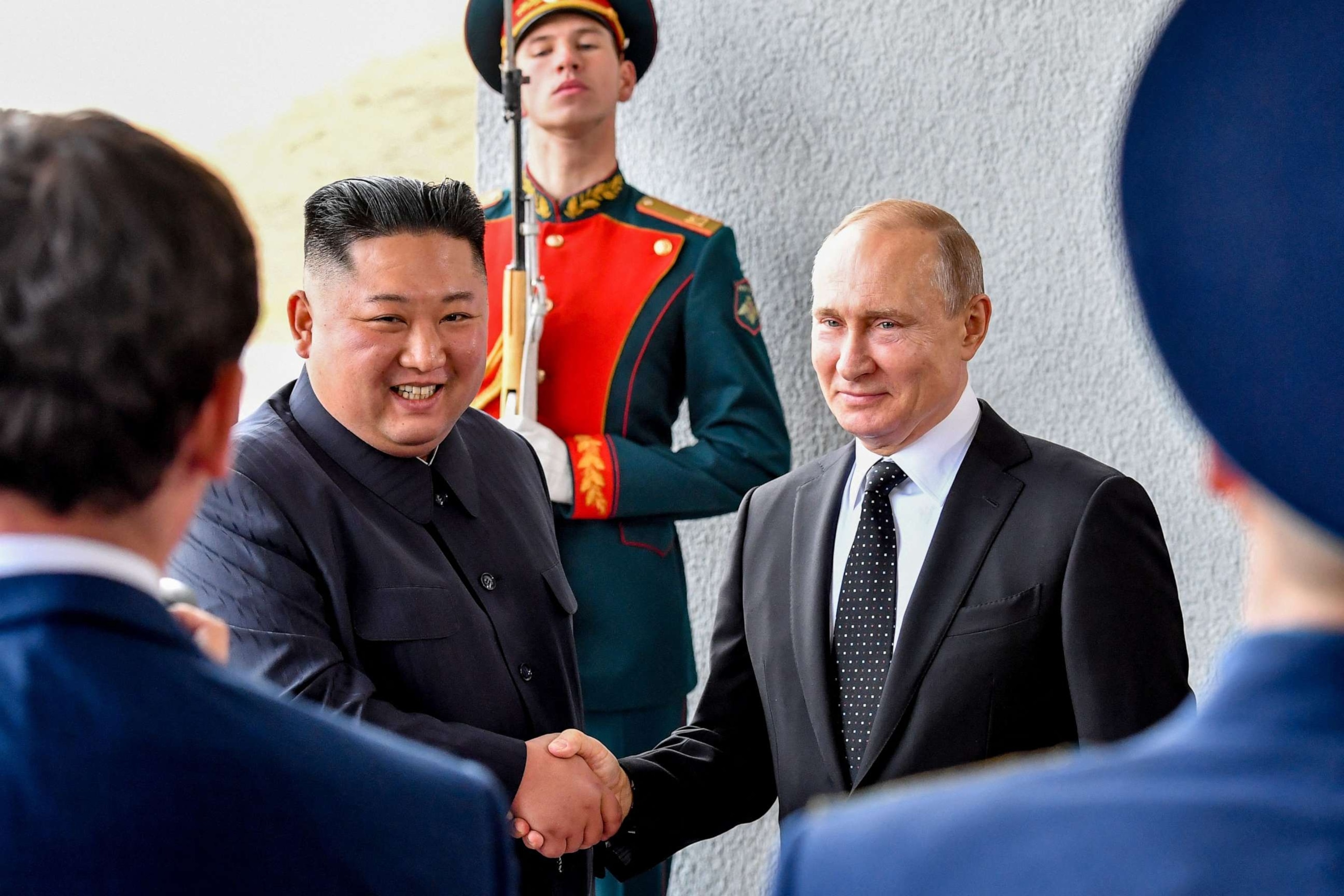Putin and Kim's increasingly cozy alliance could pose risk to the West: ANALYSIS
U.S. officials say arms talks between the two are "actively advancing."
Washington officials have depicted President Vladimir Putin's rare face-to-face meeting with North Korean dictator Kim Jong Un as an embarrassment for the Russian leader, saying the Kremlin has been forced to ask for help of a lesser power to sustain its war effort in Ukraine thanks to economic pressure from the West, analysts told ABC News.
But analysts tracking both of the increasingly isolated and volatile rulers say that while it might be true that export restrictions and other measures have forced Putin to engage with Kim in the hopes of refilling his armories, a closer alliance between the countries could present new and challenging security threats to the West.
Bruce Bennett, a defense researcher at the RAND corporation, says that Russia could soon be a boon to North Korea's nuclear program, providing Pyongyang with the technological know-how it needs to effectively or successfully launch nuclear warheads on his long-range missiles.
"Russia has at least a significant amount of that technology. If that gets to North Korea, that is really a whole lot more threatening than anything North Korea has got now," Bennett said.

The alliance is already proving beneficial to Russia. North Korea has provided Russia with at least some weaponry over the course of the last year, according to U.S. intelligence disclosures, and high-level discussions about military cooperation as well as a new arms agreement have been "actively advancing" during recent weeks.
Analysts believe Pyongyang has stockpiled millions of Soviet-era artillery shells and other ammunition that could be a solution to Russia's shortages -- drawing out the fighting in Ukraine and giving Moscow's war efforts a boost at a critical time when Kyiv's counteroffensive appears to be gaining traction.
"A lot of more people are going to die, and the conflict is going to continue to drain resources from all countries," said Bennett.

But experts say what North Korea gets in return from Russia could be even more detrimental to the interest of the U.S. and its allies.
"Russia isn't going to get artillery and anti-tank weapons and whatever else it wants for free; it's going to be forced to give North Korea what North Korea wants. And what North Korea wants is advanced technology which will serve as a bigger threat to the United States and South Korea," Bennet said.
Victor Cha, a defense advisor to the president and the senior vice president for Asia and Korea Chair at the Center for Strategic and International Studies (CSIS), and Ellen Kim, the deputy director of the Korea Chair at CSIS, say there is reason to suspect that Moscow may already be sharing sensitive military information with Pyongyang, particularly North Korea's recent advancements in developing intercontinental ballistic missiles.
"Although there has been debate over this assessment, these are capabilities that are hard to fathom the North Koreans' demonstrating or deploying, certainly over such a short period of time, without outside help," they said in a recent report.
Russia may be particularly incentivized to continue cooperating with North Korea, per some officials. Even before Kim's armored train rolled into Russia to discuss an arms deal with Putin, State Department spokesperson Matthew Miller described Putin as a beggar.
"You see him traveling across his own country, hat in hand, to beg Kim Jong Un for military assistance," Miller said on Monday. "I think obviously it means that he is having trouble sustaining the military effort, so he's looking for help from North Korea."
Miller said that U.S. officials would monitor the outcome of their meeting "very closely" and take action as need.
"We have aggressively enforced our sanctions against entities that fund Russia's war effort, and we will continue to enforce those sanctions and will not hesitate to impose new sanctions as appropriate," he vowed.
But so far, those sanctions appear to have done little to sway Moscow or Pyongyang.
Bennet also argues that unlike Putin, who still seems eager to avoid direct conflict with NATO, Kim sees stoking fear of war with the West as a political tool -- one that is perhaps necessary to retain his hold on power.
"He's using things like successful satellite launches, missiles and nuclear explosions to claim he is really powerful and capable and it's worth the while of the North Korean people that they invest their money in weapons as opposed to in feeding themselves and paying for other things they'd like to have," he said.
As for what the U.S. can do in response to strengthening alliance and any new arrangements between the countries, Cha, Kim and Bennett all argue that the Washington is limited, but that there are some options on the table.
Beyond the standard sanctions, Cha and Kim encourage a proactive approach, urging the Biden administration to declassify intelligence related to the partnership and draw attention to it at international forums, while warning China against either condoning cooperation between North Korea and Russia or taking a direct role.
Bennet says the administration should do more to destabilize Kim Jong Un, arguing that the threat he poses to stability in the Pacific has gone overlooked for too long.
"I think they have not put the effort into North Korea," he said, noting the U.S. has not significantly altered its approach to Pyongyang to reflect its advancing missile technology and last year's record-breaking spree of test launches.
"You're taking a real risk when you got a guy like him and you don't try to stop him from being able to hit you with nuclear weapons," Bennet said.





